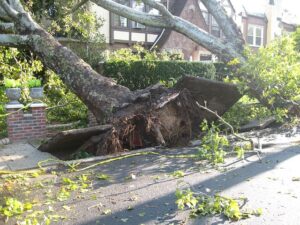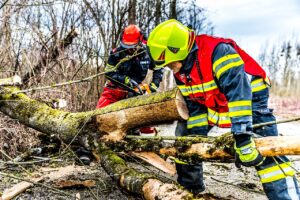Trees can add to the charm of a property. They can provide shade, add to the property’s value, and can provide nuts or fruit in season or a place for kids to hide or build a tree house. Trees can also cause damage when branches fall off or the tree is uprooted in a storm and falls on top of the roof or other parts of the home.
Most homeowners are sensible enough to have home insurance, but does it cover you if your home is damaged by a tree fall? Who is liable if the tree is not actually located on your property? To answer some of these and other questions, read on below.
Insurance cover when the damage caused by a tree is not due to negligence
Trees can damage your home when you least expect it. Strong winds and storms can break off branches and topple even the best rooted of trees. When no-one can be blamed for this sort of damage, your own home insurance must be used to recover compensation for the damage. This is the case wherever the trees were growing. If a tree that was in your neighbor’s garden, or nearby on a sidewalk or on council property, then you cannot expect to request compensation from them.
The situation is different if there is any evidence that the damage from falling branches or tree trunks toppling on to your home was caused by negligence on the part of your neighbor or council.
What is meant by negligence?
It is considered negligence if a known hazard is ignored or not dealt with sufficiently. For example, if a tree or part of a tree is known to be dead, diseased or prone to break off, then not doing something about the potential hazard could be considered negligence. If you suspect that an accident which resulted in damage to your home was avoidable if your neighbor/ government agency had acted beforehand, then you should inform your insurer. Insurance companies are usually keen to investigate the circumstances of tree damage to property that they have insured if they can determine that liability exists elsewhere. In these sorts of cases, insurers will work to determine who is responsible for paying compensation.
Whatever evidence you have that negligence could have contributed to tree damage will help your insurer decide whether to seek compensation from another party. For example, if you have had any communication with a neighbor or the council (if the tree was planted as a shade or ornamental tree on adjoining public land) about dangers that you think are present, this can help to support any claim for compensation.
Insurance cover for your own property
Unless specifically covered, if the tree or branches of the tree have not actually damaged your home, your home insurance policy might not cover the cost of the damage or the cost of removing unwanted vegetation. For example, say a tree fell on top of your car and caused substantial damage. Your home insurance policy probably does not cover damage to your car. You then need to look at your auto insurance policy. You may be able to file a claim for compensation from your auto insurance provider if there is a clause which includes damage such as damage from natural causes.
You may not be so lucky if a tree fell over and into your garden or yard. Unless there was some evidence of negligence, it doesn’t matter whether the tree was growing in your place or not, unless something that you specifically insured was damaged by the tree or parts of the tree, you may not be able to claim the cost of removing the unwanted vegetation from your property.
Your insurer may also not honor a claim if it investigates the circumstances of the tree damage and determines that they are not liable for covering the cost of the damage because you could have avoided the potential hazard by removing the tree or parts of it before the accident took place.
Taking matters into your own hands
Neighborliness is always the preferred option, but sometimes communication breaks down. If you think that a neighbor’s tree or trees could become a danger to your property, or a nearby tree or trees on public land, you do need to contain your frustration or annoyance and try and discuss your concerns as peacefully as possible. Massachusetts law makes it a potential criminal offense if you decide to take things into your own hands and trespass on to your neighbor’s property and cut down the offending tree or parts of it. The same could apply to cutting down adjoining trees or vegetation on public land.
If you are worried about a neighbor’s potentially dangerous trees, you should seek advice from the council and if not satisfied, contact an attorney. You will get legal advice and may be able to take legal action against your neighbor.
Insurance cover if you were at fault
If a tree on your own property caused damage to someone else’s home, you should not be liable unless your negligence was responsible for the damage. If the tree was dead, diseased or not monitored properly, your neighbor’s insurer may consider that you are liable for the damage done to your neighbor’s home. The lesson to be learned here, preferably in advance, is to keep a close eye on your trees if you have any and those that are growing around you. If you think that your own trees could be a danger to your own home or others, do something about it before an accident happens for which you could be considered responsible.
Seek legal advice from a real estate attorney if worried about tree damage
If you are looking to purchase a new property, or have concerns about neighboring trees, you are advised to ask a real estate attorney about your legal options if a tree causes damage to your home or to the home of others.
For more information, visit our website or contact us for a free initial legal consultation today.


